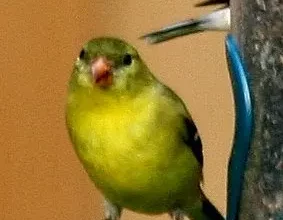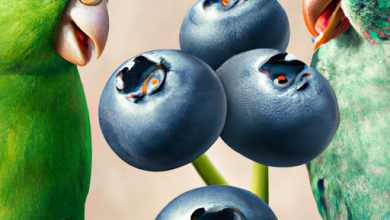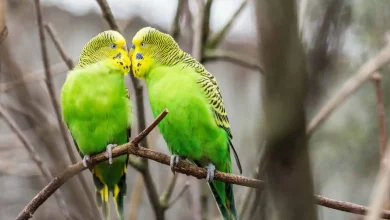Can Conures Eat Pomegranate?

What Nutrients Does Pomegranate Provide to Conures?
Pomegranate is a nutrient-dense fruit that provides a wide variety of essential vitamins and minerals to conures. This superfood is a great source of antioxidants, fiber, and essential fatty acids, making it an excellent addition to any conure’s diet.
Pomegranate is rich in vitamins A, C, E, and K, as well as minerals such as calcium, iron, magnesium, phosphorus, potassium, and zinc. Vitamin A helps conures maintain healthy vision and skin while vitamin C helps support their immune system. Vitamin E is beneficial for feather growth and maintenance while vitamin K helps with blood clotting. The minerals found in pomegranate are for bone health and muscle.
Pomegranate also contains polyphenols which are powerful antioxidants that help protect conures from free radical damage. These polyphenols also have anti-inflammatory properties which can help reduce inflammation in the body. Additionally, pomegranate contains dietary fiber which helps keep conures’ digestive systems healthy and functioning properly.
Finally, pomegranate is a great source of essential fatty acids such as omega-3 and omega-6 fatty acids. These fatty acids are important for maintaining healthy skin and feathers as well as for supporting brain development and cognitive function.
In conclusion, pomegranate is an excellent source of essential vitamins and minerals as well as antioxidants, fiber, and essential fatty acids. All of these
How to Prepare Pomegranate for Conures?
Pomegranates are a delicious and nutritious treat for conures, but they must be prepared properly in order to ensure your bird’s safety and health. Preparing pomegranates for conures is a simple process that can be done in just a few steps.
First, you must select a ripe pomegranate. Look for one that is heavy for its size and has a deep, rich color. Avoid any that have soft spots or blemishes.
Once you have chosen a pomegranate, you will need to remove seeds. Cut the pgranate in half, use a spoon to scoop out the seeds. Disc the skin and white membrane
Next, rinse seeds in cold water to remove any remaining pieces the white membrane. Then the seeds out on a paper towel and allow them to dry completely.
Once dry, you can offer the seeds to your conure. The seeds can be given as is, or you can grind them into a powder and mix them into your bird’s food.
Pomegranates are an excellent source of vitamins, minerals, and antioxidants, making them a great snack for conures. By following these simple steps, you can easily prepare pomegranates for your feathered friend.
What are the Potential Health Benefits of Feeding Pomegranate to Conures?
Pomegranate is a nutrient-rich fruit that has been used for centuries for its medicinal properties. It is an excellent source of vitamins, minerals, and antioxidants, making it an ideal choice for feeding to conures. Feeding pomegranate to conures can provide a variety of potential health benefits, including improved digestion, better immunity, and improved skin and feather health.
Digestive Health: Pomegranate contains high levels of dietary fiber, which helps to keep the digestive system functioning properly. This can help to reduce the risk of digestive issues such as constipation and diarrhea. Additionally, pomegranate is a good source of probiotics, which can help to promote the growth of beneficial bacteria in the gut. This can help to improve overall digestive health and reduce the risk of digestive issues.
Immunity: Pomegranate is packed with antioxidants, which can help to boost the immune system. Antioxidants help to protect cells from damage caused by free radicals, which can lead to chronic diseases. Additionally, pomegranate contains vitamin C, which is essential for a healthy immune system.
Skin and Feather Health: Pomegranate is a good source of essential fatty acids, which are important for healthy skin and feathers. Essential fatty acids help to keep skin and feathers hydrated and nourished, which can help to reduce the risk of skin and feather problems such as dryness and itching. Additionally, pomegranate
Are There Any Risks Associated with Feeding Pomegranate to Conures?
Feeding pomegranate to conures can be a beneficial and enjoyable experience for both the bird and its owner, as it is a tasty and nutritious treat. However, there are some risks associated with feeding pomegranate to conures that should be taken into consideration before offering it as a snack.
The first risk is the potential for choking. The seeds of a pomegranate are small and can easily be swallowed whole, which can lead to choking or intestinal blockage. For this reason, it is important to remove the seeds from the fruit before offering it to the bird. Additionally, it is important to ensure that the bird is not eating too quickly, as this can also increase the risk of choking.
Another risk associated with feeding pomegranate to conures is the potential for food poisoning. Pomegranates contain a compound called psoralen, which can be toxic if consumed in large amounts. It is important to make sure that the pomegranate is fresh and free from any contaminants before offering it to the bird. Additionally, it is important to check that the bird is not consuming too much of the fruit, as this can increase the risk of food poisoning.
Finally, it is important to consider the nutritional value of the pomegranate when feeding it to conures. While pomegranates are a good source of vitamins and minerals, they are also high in sugar and fat, which can
What are the Best Ways to Introduce Pomegranate to Conures?
Pomegranate is a nutritious and delicious fruit that can provide a variety of health benefits to conures. Introducing pomegranate to conures can be a great way to add variety and nutrition to their diet. Here are some of the best ways to introduce pomegranate to conures.
The first step in introducing pomegranate to conures is to select a ripe, juicy fruit. Pomegranates should be firm, heavy for their size, and have a deep red color. Avoid fruits that are too soft, have wrinkles, or have a dull color. Once the fruit is selected, it should be washed and then cut into small pieces. The pieces should be small enough for the conure to easily pick up and eat.
When introducing pomegranate to conures, it is important to offer the fruit in moderation. Too much pomegranate can cause digestive issues in conures, so it is important to start with small amounts and gradually increase the amount over time. It is also important to ensure that the pomegranate is served with other fruits and vegetables as part of a balanced diet.
Another way to introduce pomegranate to conures is to offer it as a treat. Pomegranate can be frozen and then offered as a frozen treat to conures. This can help make the fruit more appealing and exciting for the conure. Alternatively, pomegranate can also be offered
Excerpt
Yes, conures can eat pomegranate. This fruit is a great source of vitamins and minerals, as well as dietary fiber. It is important to note that conures should only consume the seeds of the fruit, as the skin and other parts of the pomegranate can be toxic to them.




